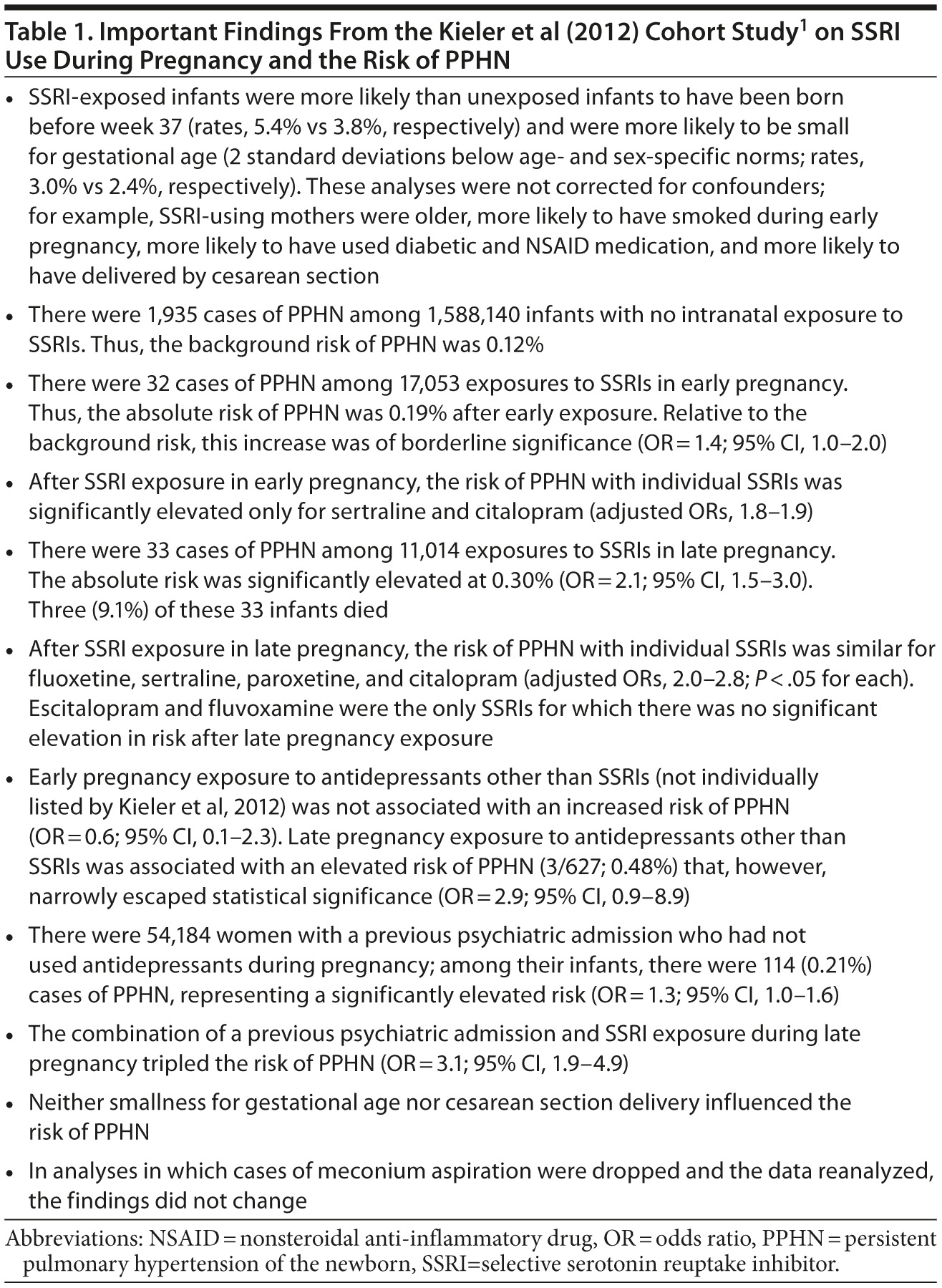A young woman with recurrent major depressive disorder has been reasonably stable on sertraline (150 mg/day) for 2 years. She is childless and plans to conceive, and a risk-benefit analysis suggests that she would do well to continue her medication during pregnancy. Having learned that a new study has shown that her medication doubles the risk of persistent pulmonary hypertension of the newborn (PPHN), she seeks a fresh opinion. This article discusses the methods, findings, strengths, and limitations of the new study and provides information which will help her physician answer the questions that she asks.

Author’s note: In this article, sertraline has been used as an example of a candidate antidepressant. This does not imply that sertraline is the preferred antidepressant for treating recurrent depressive disorder in women or for treating depression during pregnancy.
- Some studies have associated antenatal use of SSRIs with increased risk of a potentially fatal neonatal condition, persistent pulmonary hypertension of the newborn (PPHN).
- This article reviews the findings for physicians and provides plain-language talking points that can be used to answer patients’ questions and guide them in making informed decisions about treatment.
Ms M is a 33-year-old white woman with a 6-year history of recurrent major depressive disorder. After suffering 4 episodes of severe illness at an average frequency of 1 episode per year, she finally found reasonable stability during the past 2 years with sertraline dosed at 150 mg/d. She is presently undergoing cognitive-behavioral therapy to learn how to cope with her subsyndromal mood symptoms.
Ms M is childless and plans to conceive. She had earlier discussed with her physician the pros and cons of discontinuing sertraline during pregnancy and had concluded that the risk-benefit analysis clearly favored continuation. Now, however, she has learned from the Internet that a new study1 indicates that her medication could be associated with a doubled risk of a potentially fatal neonatal condition, persistent pulmonary hypertension of the newborn (PPHN). She is disturbed and seeks assistance in interpreting this new information.
Ms M has prepared a list of questions to ask:
- What is PPHN?
- Does the new study show that sertraline causes PPHN?
- Should I continue with sertraline, switch to a non-SSRI, or avoid antidepressants altogether?
What Is PPHN?
PPHN is a condition in which the pulmonary vascular resistance fails to fall after birth. As a result, the ductus arteriosus remains open to ensure circulation (for this reason, PPHN is also described as persistent fetal circulation). Affected neonates exhibit respiratory distress and may even need mechanical ventilation; inadequate respiratory support can result in anoxia and its consequences, including brain damage. The mortality risk is about 5%-10%.2
There are many causes of persistent fetal circulation, including congenital cardiac disease, meconium aspiration (and other causes of lung injury), perinatal asphyxia, and sepsis. Selective serotonin reuptake inhibitors (SSRIs) have also been etiologically implicated with the explanatory hypothesis that serotonin can cause vasoconstriction as well as stimulate growth of the smooth muscle layer in the pulmonary arteries.3
What Is the Evidence Linking SSRIs to PPHN?
Prior to 2012, some studies had associated antenatal SSRI use with PPHN,4,5 whereas other studies had failed to demonstrate a risk.6-8 As a result, on December 14, 2011, the US Food and Drug Administration (FDA) issued a notification that “given the conflicting results from different studies, it is premature to reach any conclusion about a possible link between SSRI use in pregnancy and PPHN.”9 The FDA therefore advised health care professionals “not to alter their current clinical practice of treating depression during pregnancy.” The FDA advisory suggested that health care professionals should “weigh the small potential risk of PPHN that may be associated with SSRI use in pregnancy against the substantial risks associated with undertreatment or no treatment of depression during pregnancy.” PPHN, however, is a rare condition; therefore, the small sample sizes in the literature on which the FDA9 review was based limit the usefulness of the conclusions of the review.
How Was the New Study Conducted and What Did It Find?
In 2012, Kieler et al1 reexamined the association between SSRIs and PPHN in the largest study so far, using prospectively collected (thus precluding recall bias), 1996-2007 data from national health registers in Denmark, Finland, Iceland, Norway, and Sweden. The subjects in this population-based cohort study comprised all singleton births (n = 1,618,255) after 33 weeks of gestation. Among these, 17,053 (1.1%) mothers had filled a prescription for an SSRI in early pregnancy (fluoxetine, n = 3,899; citalopram, n = 6,816; paroxetine, n = 2,293; sertraline, n = 3,396; fluvoxamine, n = 278; escitalopram, n = 2,510), and 11,014 (0.7%) mothers had filled a prescription for an SSRI during late pregnancy (fluoxetine, n = 3,315; citalopram, n = 3,294; paroxetine, n = 1,281; sertraline, n = 2,843; fluvoxamine, n = 112; escitalopram, n = 557). Early pregnancy was defined to extend from 3 months before pregnancy to the end of 8 weeks of gestation, and late pregnancy was defined to extend from the start of week 21 of gestation to the time of delivery. Overall, 1.9% of women had used an SSRI at some time during pregnancy.
Odds ratios and 95% confidence intervals were calculated after adjusting for maternal age, nonsteroidal anti-inflammatory drug and antidiabetes drug use, preeclampsia, chronic diseases during pregnancy, country of birth, birth year, level of delivery hospital, and birth order. Important findings from the study are presented in Table 1.
Interpretation and Critical Viewpoint
This large study1 provides strong evidence that SSRI use during pregnancy, particularly after week 20 of gestation, is associated with an increased risk of PPHN. There are several possible explanations that are not necessarily mutually exclusive:
- SSRIs as a class of drugs may increase the risk of PPHN (because the risk was similarly elevated with all SSRIs in analyses that were adequately powered).
- The psychiatric illness for which SSRIs are prescribed may be responsible for the elevated risk (because the risk was increased in women with a history of past psychiatric admission even when there was no use of antidepressants during the index pregnancy). Here, however, psychiatric admission is probably a marker of illness severity that predisposes to an experience or behavior that increases the risk.
- Psychiatric medications as a class may increase the risk of PPHN (women with a previous psychiatric admission may have been taking non-antidepressant psychotropic medications).
- There may be an interaction between antidepressant drugs and psychiatric illness that significantly elevates the risk (because the risk was highest in women with a previous psychiatric admission who took antidepressants during the index pregnancy). Regrettably, Kieler et al1 did not provide an analysis of PPHN risk in women with a psychiatric diagnosis who did or did not have a previous psychiatric admission subcategorized by use or no use of antidepressants during pregnancy.
Why the Findings of the New Study Probably Should Not Change Current Practice
- As already listed, many explanations are possible for the increased risk of PPHN associated with SSRIs; an etiologic role for SSRIs or psychiatric illness or an interaction between the two cannot be established through observational studies such as that of Kieler et al.1 It is possible that SSRI use and a history of psychiatric admission may merely be markers for unidentified behaviors or risk factors (residual confounds) that are more directly responsible for PPHN.
- Even if SSRIs were etiologically responsible for PPHN in the Kieler et al1 study, the absolute risk with late pregnancy exposure was small (0.30% against a background risk of 0.12%), and the number needed to harm (NNH) was 556. For early pregnancy exposure, the absolute risk was even smaller (0.19%), and the NNH was higher (1,429). In other words, about 500-1500 women will need to receive an SSRI during early or late pregnancy for 1 extra neonate to develop PPHN. These risks are small, given that untreated depression can have a significant adverse impact on a wide range of pregnancy outcomes.10,11
Ms M, whose case was outlined at the start of this article, asked whether she should switch to a non-SSRI antidepressant. In addition to the points discussed above, she should understand that the absence of significant risk of PPHN with “other antidepressants” in the Kieler et al1 study could merely have been due to a lack of statistical power. For example, there were only 627 exposures to “other antidepressants” during late pregnancy in contrast with 11,014 exposures to SSRIs. Furthermore, relative to the literature base available for SSRIs, there is little hard information available on the safety of non-SSRI antidepressants with regard to different pregnancy-related outcomes. Finally, there is no assurance that other antidepressants will as effectively stabilize her mood disorder as sertraline appears to have done.
Other Study-Specific Critical Comments
- There is no assurance that women who filled a prescription for an SSRI actually took the SSRI during the period of risk. Kieler et al1 observed that this is not necessarily a limitation, because if SSRIs truly predispose to PPHN, then classifying women as having received SSRIs when they did not would bias the results toward the null hypothesis. However, this argument fails if residual confounding associated with the psychiatric indication was responsible for the PPHN risk, in which case a significant result would still emerge, resulting in false implication of the SSRI. Occhiogrosso et al3 provided a useful discussion on different confounds associated with depression and SSRI treatment in the context of PPHN.
- Many analyses were probably underpowered in this study, including the analyses related to infrequently prescribed antidepressants. For example, the apparent safety of escitalopram and fluvoxamine could have been due to the low exposure to these 2 drugs.
Additional Comments
It has been suggested that when PPHN appears to result from SSRI exposure, there should be good chances for full recovery.2,3 This suggestion is intuitively appealing. However, in the Kieler et al1 study, there was a 9% mortality rate in infants who developed PPHN after exposure to SSRIs during late pregnancy; this was no different from the background rate of mortality in unexposed infants with PPHN in the same study. Kieler et al1 did not present mortality data on infants who developed PPHN in other exposure groups.
J Clin Psychiatry 2012;73(5):e601-e605 (doi:10.4088/JCP.12f07731)
© Copyright 2012 Physicians Postgraduate Press, Inc.
J Clin Psychiatry 2012;73(5):e601-e605 (doi:10.4088/JCP.12f07731)
© Copyright 2012 Physicians Postgraduate Press, Inc.
 Each month in his online column, Dr Andrade considers theoretical and practical ideas in clinical psychopharmacology with a view to update the knowledge and skills of medical practitioners who treat patients with psychiatric conditions.
Each month in his online column, Dr Andrade considers theoretical and practical ideas in clinical psychopharmacology with a view to update the knowledge and skills of medical practitioners who treat patients with psychiatric conditions.
Department of Clinical Psychopharmacology and Neurotoxicology, National Institute of Mental Health and Neurosciences, Bangalore, India ([email protected]).
Financial disclosure and more about Dr Andrade.
References
1. Kieler H, Artama M, Engeland A, et al. Selective serotonin reuptake inhibitors during pregnancy and risk of persistent pulmonary hypertension in the newborn: population based cohort study from the five Nordic countries. BMJ. 2012;344:d8012. PubMed doi:10.1136/bmj.d8012
2. Koren G, Nordeng H. SSRIs and persistent pulmonary hypertension of the newborn. BMJ. 2012;344(jan12 3):d7642. PubMed doi:10.1136/bmj.d7642
3. Occhiogrosso M, Omran SS, Altemus M. Persistent pulmonary hypertension of the newborn and selective serotonin reuptake inhibitors: lessons from clinical and translational studies. Am J Psychiatry. 2012;169(2):134-140. PubMed doi:10.1176/appi.ajp.2011.11040553
4. Chambers CD, Hernandez-Diaz S, Van Marter LJ, et al. Selective serotonin-reuptake inhibitors and risk of persistent pulmonary hypertension of the newborn. N Engl J Med. 2006;354(6):579-587. PubMed doi:10.1056/NEJMoa052744
5. Kפllén B, Olausson PO. Maternal use of selective serotonin re-uptake inhibitors and persistent pulmonary hypertension of the newborn. Pharmacoepidemiol Drug Saf. 2008;17(8):801-806. PubMed doi:10.1002/pds.1570
6. Andrade SE, McPhillips H, Loren D, et al. Antidepressant medication use and risk of persistent pulmonary hypertension of the newborn. Pharmacoepidemiol Drug Saf. 2009;18(3):246-252. PubMed doi:10.1002/pds.1710
7. Wichman CL, Moore KM, Lang TR, et al. Congenital heart disease associated with selective serotonin reuptake inhibitor use during pregnancy. Mayo Clin Proc. 2009;84(1):23-27. PubMed doi:10.4065/84.1.23
8. Wilson KL, Zelig CM, Harvey JP, et al. Persistent pulmonary hypertension of the newborn is associated with mode of delivery and not with maternal use of selective serotonin reuptake inhibitors. Am J Perinatol. 2011;28(1):19-24. PubMed doi:10.1055/s-0030-1262507
9. Food and Drug Administration. FDA Drug Safety Communication: selective serotonin reuptake inhibitor (SSRI) antidepressant use during pregnancy and reports of a rare heart and lung condition in newborn babies. http://www.fda.gov/Drugs/DrugSafety/ucm283375.htm. Published December 14, 2011
10. O’ Keane V, Marsh MS. Depression during pregnancy. BMJ. 2007;334(7601):1003-1005. PubMed doi:10.1136/bmj.39189.662581.55
11. Davalos DB, Yadon CA, Tregellas HC. Untreated prenatal maternal depression and the potential risks to offspring: a review. Arch Womens Ment Health.2012;15(1):1-14. PubMed
This PDF is free for all visitors!






